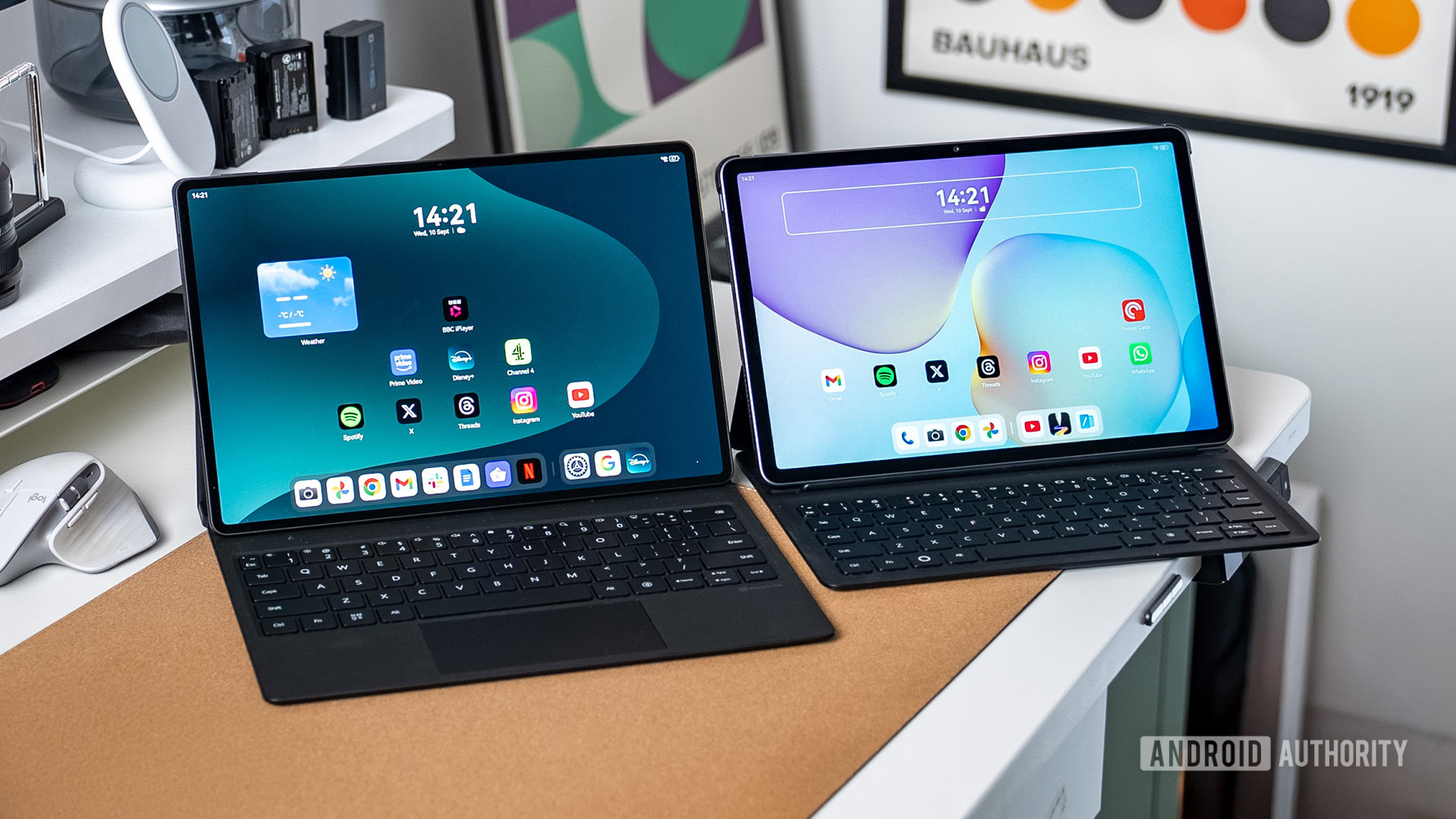Price
The Galaxy Watch 8 costs $50 more than the Galaxy Watch 7. The Watch 8 starts at $349.99 for the Bluetooth-only 40mm version, while the Watch 7 starts at $299.99 for its corresponding model. The 44mm version of the Watch 8 costs $379.99 compared with $329.99 for the 44mm Watch 7. LTE functionality adds an extra $50 to the cost of any of the models.
Left to right: The 44mm and 40mm Galaxy Watch 8 (Credit: Eric Zeman)
Both watches come in 40mm and 44mm versions with two color options for each. The Watch 8 comes in graphite or silver. The small Watch 7 comes in green or cream, while the larger variant is available in green or silver.
Note that you can now often find the Galaxy Watch 7 at a discount since it’s older. It’s currently almost half off for Amazon Prime Day.
Winner: Galaxy Watch 7
Power
Both the Galaxy Watch 8 and the Galaxy Watch 7 have a five-core Exynos W1000 processor with 2GB of memory and 32GB of storage. The Galaxy Watch 8 ships with Samsung’s One UI 8 interface on top of Google’s Wear OS 6 software, and both platforms are one generation above what’s currently available on the Watch 7. The Watch 7 will eventually get both upgrades, minus some of the AI-enabled features detailed below. Otherwise, it keeps up with newer model well.
Winner: Galaxy Watch 7
Battery Life
For years, our biggest gripe with Samsung’s Galaxy watches has been battery life, and the Galaxy Watch 8 finally gets a bump there. The larger Watch 8 has a 435mAh cell and the smaller model has a 325mAh battery, up from 425mAh and 300mAh last generation, respectively.
The increase is pretty small, and Samsung has tempered expectations around it; the extra power will likely keep battery life similar despite the extra features in the newer models. Specifically, a rep estimated both versions of the Watch 8 would last 40 hours without the always-on display active and 30 hours with it enabled.
The Watch 7 lasted 28 hours without the always-on display enabled, and 22 hours with it activated, in our testing. The Watch 8 could be slightly better on this front, but we’ll need to test it to be sure.
Winner: Galaxy Watch 8
Screen
The Galaxy Watch 8 has a brighter screen than the Galaxy Watch 7, but the dimensions and resolution are otherwise identical. On both the Watch 8 and the Watch 7, the 44mm models have a 1.5-inch, 480-by-480-pixel Super AMOLED screen, while the 40mm versions have a 1.3-inch, 432-by-432-pixel screen.

The Galaxy Watch 7 in sunlight (Credit: Andrew Gebhart)
The Watch 8 can reach 3,000 nits of brightness, whereas the Watch 7 tops out at 2,000 nits. The Watch 7 is still bright enough to be seen even in direct sunlight, but the Watch 8 should provide extra visibility in that circumstance.
Winner: Galaxy Watch 8
Design
Both the Galaxy Watch 8 and the Galaxy Watch 7 can survive harsh weather conditions and elements. They share a 5ATM waterproof rating, meaning they can survive up to 164 feet of calm fresh or salt water for 10 minutes. Both also have a MIL-STD-810H certification, meaning they can endure extreme temperature changes, blowing sand, and other environmental stressors such as vibration and shock. They’re also both rated at IP68 for general dust and water resistance.
The Galaxy Watch 8 features a more squared bezel (Samsung calls it a “cushion design”) and a dynamic lug system brought over from the Galaxy Watch Ultra series. Samsung says the design changes should help the watch move more naturally and comfortably with your wrist. On the inside, the tech components have been rearranged, allowing for a frame that is 11% thinner than the last generation.

Get Our Best Stories!
All the Latest Tech, Tested by Our Experts

By clicking Sign Me Up, you confirm you are 16+ and agree to our Terms of Use and Privacy Policy.
Thanks for signing up!
Your subscription has been confirmed. Keep an eye on your inbox!
Thinness aside, I actually prefer the more rounded look of the Galaxy Watch 7 at a glance.
Winner: Galaxy Watch 7
Fitness and Health
Samsung focused on improving activity, exercise, sleep, and stress tracking with the Galaxy Watch 8, but health monitoring is already a strength of the Watch 7 and its predecessors.
The previous-gen model can detect sleep apnea and give you a detailed picture of your metabolism through advanced glycation end products (AGEs) index tracking. Like even earlier Galaxy Watches, the Galaxy Watch 7 can monitor your heart rate and blood oxygen saturation (SpO2) levels, and even measure body composition and body fat similar to a smart scale. It can track your sleep and even your snoring if you have a nearby Samsung phone.

Energy Score on the Watch 7 (Credit: Andrew Gebhart)
The Galaxy Watch 7 was the first Samsung watch to use AI for holistic health tracking. It encapsulates all of your health metrics into a single daily Energy Score from 0 to 100, and then uses that score to offer a personalized daily wellness tip designed to help improve your overall well-being.
The Galaxy Watch 8 builds on that, using Samsung’s AI to bring extra details to its health and sleep tracking. A sleep coaching feature will learn your body’s circadian rhythm over time and then aim to offer advice about when to get to bed to help optimize your rest and restoration. While you sleep, the Watch 8 will measure your vascular load for extra insights into your stress and energy levels.
Recommended by Our Editors
A Watch 8 running coach can gauge your fitness level with a 12-minute test, then help you create a personalized plan for an upcoming marathon or fitness goal. It’ll even offer tailored encouragement while you work out, similar to Apple’s Workout Buddy.
The Watch 8’s coolest new feature could even save you a trip to the doctor. It can measure your antioxidant levels with a simple test that involves putting your finger on a sensor on the back of the watch. Similar tests usually involve getting blood drawn.

You can place your finger on the back of the Watch 8 to measure your antioxidant levels (Credit: Eric Zeman)
Altogether, the improved AI in the Galaxy Watch 8 will do much more than provide a single, static score and piece of advice like the Watch 7 provides. It’s been integrated into much more of the minutiae of tracking and can provide details and coaching while still offering a holistic overview of your wellness.
While the Watch 7 will eventually get access to the same software as the Watch 8, these AI insights will stay exclusive to the newer model.
Winner: Galaxy Watch 8
Lifestyle Features
On the lifestyle front, the Watch 8 will also have Google’s Gemini built in if you need help from a generative AI assistant. Gemini will be able to answer questions, send texts, and interact with Samsung apps like Calendar, Clock, Health, and Reminder, providing a new hands-free way to interact with your watch. Samsung hasn’t stated if this feature will roll out to older watches like the Galaxy Watch 7.
Otherwise, the Watch 8 and Watch 7 will have access to all of the same apps through Google’s Wear OS. They’ll both be able to do everything else you’d expect, like make phone calls and send texts. The Watch 8 has the edge for now, but the Watch 7 could catch up if it’s updated with Gemini support.
Winner: Galaxy Watch 8
Which Watch Is Right for You?
It’s no surprise that the Galaxy Watch 8 is generally more capable than its predecessor, but the biggest benefit will come from its enhanced AI. Given the similar hardware, you probably don’t need to upgrade if you’re happy with your Watch 7, especially if the new AI features don’t offer any special appeal for you. Even if you aren’t upgrading, you can save a lot of money if you opt for the Watch 7 over the Watch 8 without losing out on too much. That said, stay tuned for our definitive buying advice—the Galaxy Watch 8 is available for preorder now and comes out on July 25. We plan to put it to the test soon, so check back soon for a full review.








